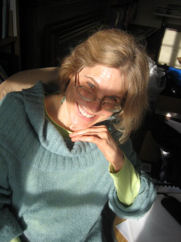When I got out of the shower the other day there was a message on the answerphone to say that my uncle Jonathan, my mother’s half brother, had died. I didn’t even know he was sick. That is, I knew he was sick – he had been for 25 years – but I didn’t know he was dying sick.
Jonathan was a haemophiliac. As a child he was confined to a wheel chair, the result of constant bleeding into his joints. He struggled to walk on crutches and then finally to walk unaided. As a young man he worked to register voters, mainly poor and black, in his home state of Virginia, and marched – with his pronounced limp –against the war in Vietnam.
In the early 80s, like the majority of severe haemophiliacs, Jonathan contracted the HIV virus. The product haemophiliacs needed was made by mixing the blood of up to 30,000 people. If you needed the stuff a couple of times a month or more – and Jonathan did – you were pretty lucky not to get HIV.
Another of my uncles, also a severe haemophiliac, must have been infected at about the same time and died of AIDs within only a few years. It was a particularly ugly death. The virus laid waste to his body and burrowed into his brain.
We thought it was inevitable that Jonathan would share the fate of his brother soon. Early on there were no treatments, though he could track his T cell count as his immune system crumbled.
Around then the British ran a stunning series of tele adverts with the slogan, “Don’t die of ignorance”. There’s a good description here, though unfortunately the video clips are not available unless you are accessing the site from a UK school or university. The ads are still rated number 49 in the top 100 scariest moments on British television. Meanwhile headlines screamed of the bravery of the Princess of Wales when she shook hands with AIDs patients without gloves on. The disease carried a terrible stigma. I told no one but my closest friends that my family was affected.
HIV was new, terrible and always fatal. Despite the ad’s warnings we were almost completely ignorant, because there was very little real information beyond the sensational press. On a long ago balmy evening I sat with my brother, my mother, various cousins, and Jonathan in a New England kitchen, with the usual summer annoyance of a lone mosquito humming in the air. Only it wasn’t usual because as we were chit chatting away we were all silently trying to remember whether the news had ever mentioned this method of transmission – hell, it’s how you get malaria, and what did we know? Finally Jonathan slapped the mosquito on my mother’s arm and it splatted red. “Your blood, Anne,” he said, and then he smiled.
Jonathan survived until AZT, and he carried on surviving until the HIV Cocktail. We began to think of him as indestructible. He was angry about what happened to him, and, always an activist, founded the Committee of the Ten Thousand, a group that fought for justice for haemophiliacs infected with HIV.
Ironically in the end it was probably the drugs he took to keep the virus at bay that got him, or the hepatitis infection, which was also a constant risk in blood transfusions. Jonathan died of liver cancer last week, aged 62.
Years ago he and my mother fought over the care of their dying father and over their father’s will, and they had not seen each other in a very long time. My mother telephoned every now and again and Jonathan was always charming, but he never called her and they never again became loving brother and sister.
When he died his widow phoned my number in England – I am the only one who hasn’t moved in decades – before she tracked me down here. She said she hadn’t really noticed how estranged Jonathan had become from his family.
I am too far away and won’t go to the funeral, nor will my mother who is even further away and cannot muster the energy, though I think it will be hard on her to miss it. Although they had quarrelled, he was her father’s son and the last of her three brothers.
I thought of him today as he was buried. He was a brave man. His work for justice for haemophiliac victims of AIDs made a difference. The Boston Globe ran a full obituary here.






Thank you for sharing this with us. The article about your Uncle was very interesting and you should be so proud of his work. My prayers are with you and your family.
Comment by Midlife Slices™ — June 17, 2008 @ 8:11 am
Thank you for that. I was not so much sad as angry, all over again, when I wrote. What was called the Haemophiliac holocaust was preventable — which was, of course, Jonathan’s point. When I was looking up a few details for this post I discovered that there were deniers of this holocaust too.
Comment by Duchess — June 17, 2008 @ 1:10 pm
I’d read the obituary about your uncle when it was published in the Globe. He did great things. I’m sorry he and your mother were estranged. That’s how things sometimes go between siblings. I have a friend whose son is a hemophiliac (U.S. spelling) and he’s hanging in there far beyond the years they thought he would.
Thanks for sharing such a personal story.
Comment by Candelaria — June 17, 2008 @ 9:31 pm